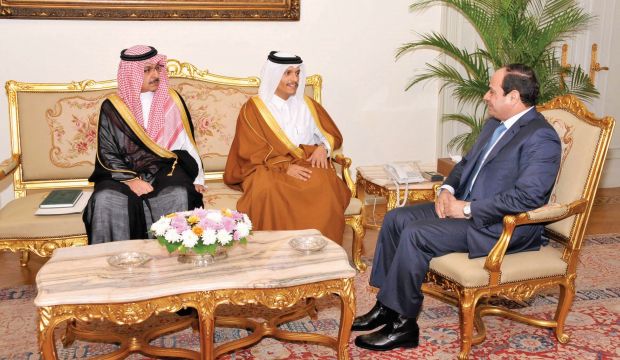
Egyptian President Abdel-Fattah El-Sisi (R) receives Qatari envoy Sheikh Mohammed Bin Abdul Rahman Al Thani and the head of the Saudi Royal Court Khalid Al-Tuwaijiri in Cairo on December 21, 2014 (Egyptian presidency)
Cairo, Asharq Al-Awsat—Qatar recalled its ambassador to Egypt on Wednesday following a dispute over the latter’s bombing campaign of Islamic State of Iraq and Syria (ISIS) targets in Libya, Qatar’s state news agency QNA reported.
The Qatari Foreign Ministry said Doha was taking the action in response to comments made by Tariq Adel, Egypt’s representative at the Arab League, following a foreign ministers’ meeting at the organization’s headquarters in Cairo on Wednesday.
Adel said reservations expressed by Qatar over Egypt striking ISIS targets in Libya “exposed its support for terrorism.”
The Arab League had earlier offered Egypt its full backing of the strikes, saying Cairo had the right to defend itself and its citizens following the murder of 21 Egyptian workers in the country, abducted and killed by militants claiming to be members of the extremist group. The League also supported calls from Cairo for the lifting of an arms embargo on the Libyan army.
But Qatar said it was concerned the strikes could harm civilians and chided Egypt for flouting Arab League statutes which require consultation between member states in case of one member “launching a unilateral military action” against another. It also rejected calls for the lifting of the arms embargo.
In addition to its stance on terrorism, Adel said Qatar’s position also showed it was “outside the Arab consensus” on the strikes, adding that Doha was now “completely isolated” among Arab states.
But the six-member Gulf Cooperation Council (GCC) on Thursday offered its support for Qatar’s position.
In a statement, GCC Secretary General Abdullatif Al-Zayani said the organization “rejects accusations by Egypt’s permanent envoy at the Arab League that Qatar supports terrorism.”
Zayani called the accusations “unfounded,” and said they “contradict reality, and ignore the sincere efforts by Qatar as well as the Gulf Cooperation Council and Arab states in combating terrorism and extremism at all levels.”
The spat over the strikes threatens to reignite recent tensions involving Egypt, Qatar, and the GCC.
Egypt and GCC members such as Saudi Arabia, the UAE and Bahrain all accuse Qatar of supporting the Muslim Brotherhood organization, which was banned in Egypt and several Gulf states in late 2013 and 2014 respectively.
The tensions began to escalate following the ouster of former Egyptian president Mohamed Mursi, a senior member of the Brotherhood, in July of 2013, following army intervention in response to mass protests against his one-year rule.
Following a crackdown in Egypt on the organization, Cairo and its Gulf allies accused Qatar of providing a safe haven for members of the Brotherhood wanted in Egypt and elsewhere, and said the Qatar-based Al-Jazeera TV news channel was conducting a deliberate negative media campaign against Egypt.
The row came to a head in March of 2014 when Saudi Arabia, the UAE and Bahrain all withdrew their ambassadors from Doha, a situation which was only resolved eight months later when the ambassadors returned in November. This prompted moves for rapprochement between Cairo and Doha, with meetings between officials from both countries taking place.
Egypt began strikes on targets in Libya believed to belong to ISIS on Monday in response to an ISIS video alleging to show the abduction and killing of 21 Egyptian Coptic Christian workers in the country.
Egypt has long been concerned about the situation in neighbor Libya, where Islamist and other militias are currently battling a re-formed Libyan army for control of large parts of the country including the capital Tripoli and the port city of Benghazi.
The Egyptian Foreign Ministry said on Tuesday its F-16 fighter jets had hit bases belonging to ISIS in the eastern Libyan city of Derna.
Mohamed Mustafa Abu Shama contributed additional reporting.
